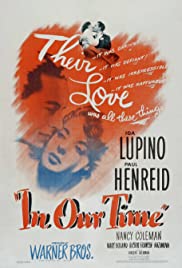
IN OUR TIME
US, 1944, 110 minutes, Black and white.
Ida Lupino, Paul Henreid, Nancy Coleman, Nazimova, Mary Boland, Victor Francen, Michael Chekhov.
Directed by Vincent Sherman.
In Our Time is an emotional melodrama which served as propaganda in World War Two.
The film is set in Poland in 1939, shows English visitors, the Polish aristocracy, the struggle with persuading peasants to till the land, the hopes for cavalry working against tanks when the war breaks out. The film is slow and measured, focusing on the romance rather than war action.
Ida Lupino is very British. Paul Henreid is very gallantly middle-European. An interesting supporting cast includes Nazimova as Henreid's mother, a very sullen Nancy Coleman as his sister and Mary Boland doing one of her usual turns as a garrulous antiques dealer. Direction by Vincent Sherman with a Franz Waxman score.
1. Appealing war story? Romance? Propaganda? 1944?
2. Warner Bros production: black and white photography, re-creation of Poland, Polish society? War atmosphere? Franz Waxman score?
3. The title, the reference to Neville Chamberlain’s speech about peace, the outbreak of war, Poland and the Nazi invasion, the bombing of Warsaw? The European war? The final speech?
4. The blend of romance, story of Polish society, the war? measured pace? Human interest?
5. Jenny's story: reading to Mrs Bromley, the history of Poland, her work in the shops, buying the antiques, bargaining? The encounter with Stefan in the shop, the discussion about Chopin? Going to the concert, going out with Stefan, drinking and exhilarated, seeing the sights? His proposal to marry, her acceptance? Going to visit the family, the hostility, the interview with Uncle Pavel? Her decision to leave? The discussion with Mrs Bromley, buying the sweets at the train? Being rescued by Stefan? The marriage, happy, the ideas for modernising the farm, the introduction of tractors, trying to persuade the peasants? Jenny's ideas, sharing the harvest? The celebratory party? The visit to Mass? The outbreak of the war, Stefan's going, anxiety, the family moving away, his return, the setting fire to the house and the crops? The bombing of Warsaw? The English girl, middle class, changing Polish aristocracy?
6. Stefan, his wealth, meeting Jenny, the gift for his mother, the discussion about Chopin, seeing her at the concert, going out dancing, the sights, proposal? The hostility of his family, his sister's harshness? His mother living in another world? Uncle Pavel and the money? The importance of class and aristocracy? Having to give it up? Training the peasants, his impatience? Uncle Pavel and the clash? War service? Return?
7. Stefan's mother, the aristocrat, going demented, not able to accept the changes? Giannina and her snobbery, hostility, leaving?
8. Pavel, entertaining the Nazis on the hunt, the compromises, change of government, the invasion, his hold over the household, his collapse? The contrast with Leopold, as the poet, support for Jenny? Patriot?
9. The picture of the peasants, their fears, not driving the tractors, getting out of control? The change for the harvest? Success? The celebration and his sermon, his belief in the Polish cavalry, standing up to the Nazis?
10. The sketch of Mrs Bromley, her chatter, selfishness?
11. The portrait of old Poland, the new, the experience of war, the suffering, hopes for post-war building?
12. The film in retrospect - and the history of Poland.